How to install the app on iOS
Follow along with the video below to see how to install our site as a web app on your home screen.
Note: This feature may not be available in some browsers.
You are using an out of date browser. It may not display this or other websites correctly.
You should upgrade or use an alternative browser.
You should upgrade or use an alternative browser.
Pakistan Minorities worship places
- Thread starter ghazi52
- Start date
ghazi52
PDF THINK TANK: ANALYST

- Joined
- Mar 21, 2007
- Messages
- 101,794
- Reaction score
- 106
- Country
- Location

Gurdwara Arambagh, Karachi
Stifled amid two large buildings stands a symbol of the inter-communal harmony that has been the cultural hallmark of the Sindhi Nation since many a millenia . This white, two-storey building is the Gurdwara Arambagh in Karachi, the provincial capital of Sindh province. A 'No Parking' sign has been crudely painted onto the building. A signboard on the door of the Gurdwara Arambagh reads, "Recognise the human race one. Gurdwara Sahab Arambagh, Karachi (Sindh)." A bit of trivia: the historical pre-Independence name of this area was Rambagh (Garden of Ram) which was renamed Arambagh (Garden of Rest) after 1947.
ghazi52
PDF THINK TANK: ANALYST

- Joined
- Mar 21, 2007
- Messages
- 101,794
- Reaction score
- 106
- Country
- Location
Hindus in Khyber-Pakhtunkhwa
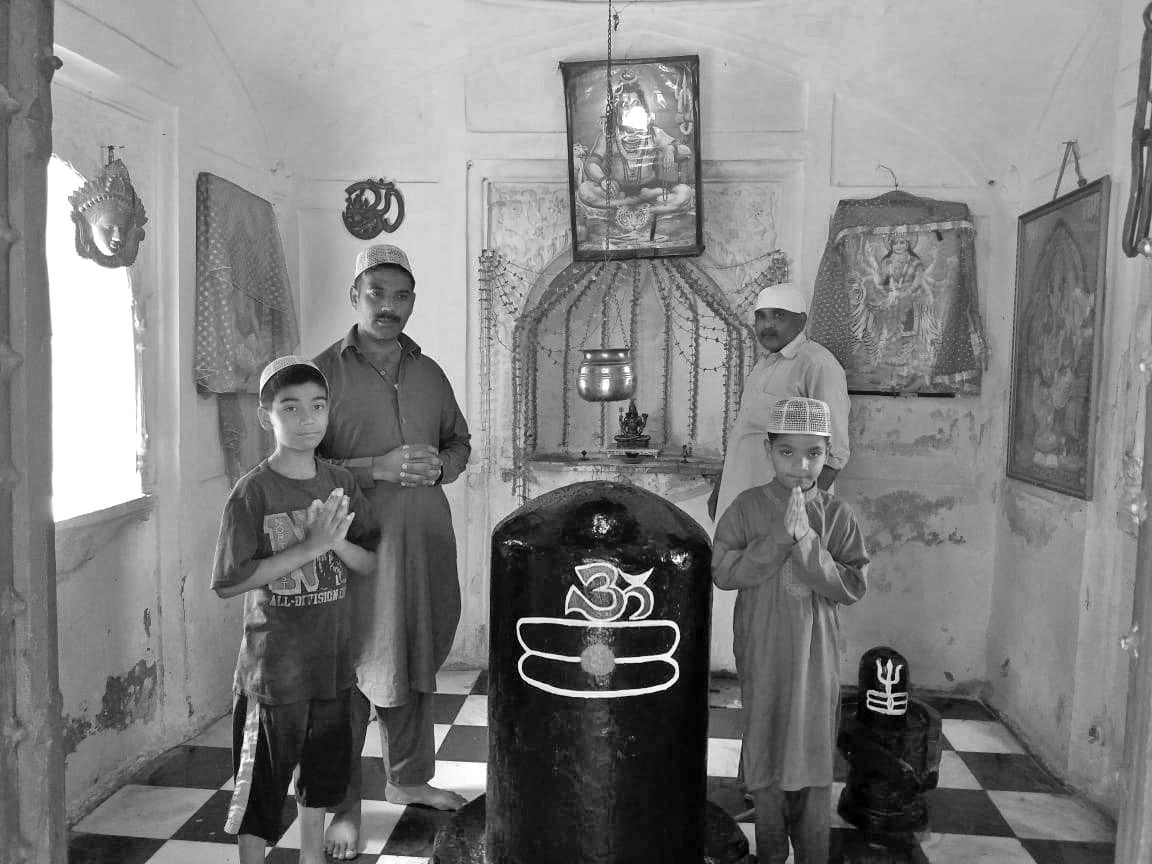
PESHAWAR: As the sun grows on the soft autumn sky, Zahid Kumar and his two sons take to the historic Goro Goraknath temple in the middle of Peshawar, to spend their day in service. “It’s not our job to clean the temple, but doing so brings my family a sense of religious fulfilment,” says the bronze-skinned gent.
Pre-independence, the province of Khyber-Pakhtunkhwa was home to approximately 50,000 Hindu families. But in the years after partition, the number dropped to only 1,200 in Peshawar as people migrated en masse to the other side of the border.
However, for all those who stayed back like Kumar, a sturdy man of 35, the city of Peshawar became a haven where they could continue to enjoy religious freedom and live peacefully alongside the Muslims.
“We’ve always lived in peace with our Muslim neighbours; we participate in their religious festivals and mourn with them in their days of sorrow like they do in our,” shares Kumar, who’s also the former president of Sankar Civil Society and a member of the National Peace Force Committee for Interfaith Harmony (NPFCIH). “Recently, the local Hindu community has also started setting up Sabils in the month of Muharram to honour the sacrifices of Hussain (RA),” he added.
The city of Peshawar today is home to four Hindu tribes – the Balmiks, the Rajputs, the Heer Ratan Raths and the Bhai Joga Singh Gurdwara community. Since partition, the four tribes have lived in harmony with all religious communities, sharing a special rapport with those of the Muslim faith. “There’s a mosque right in front of our temple, so there’s a lot of intermingling of the two faiths and we greet each other regularly,” said Kumar, as his sons frolicked barefoot on the courtyard’s sun-baked concrete floor.
Northern Pakistan
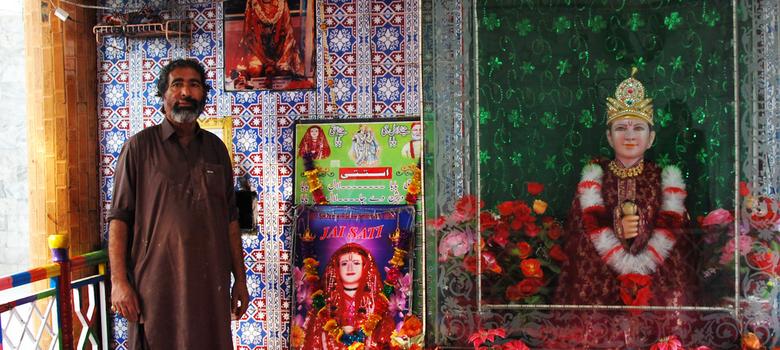
Hindu community in Khyber-Pakhtunkhwa cut short Maha Shivratri celebrations
In Mansehra district, the Hindu community have their annual Maha Shivratri celebrations for three days.
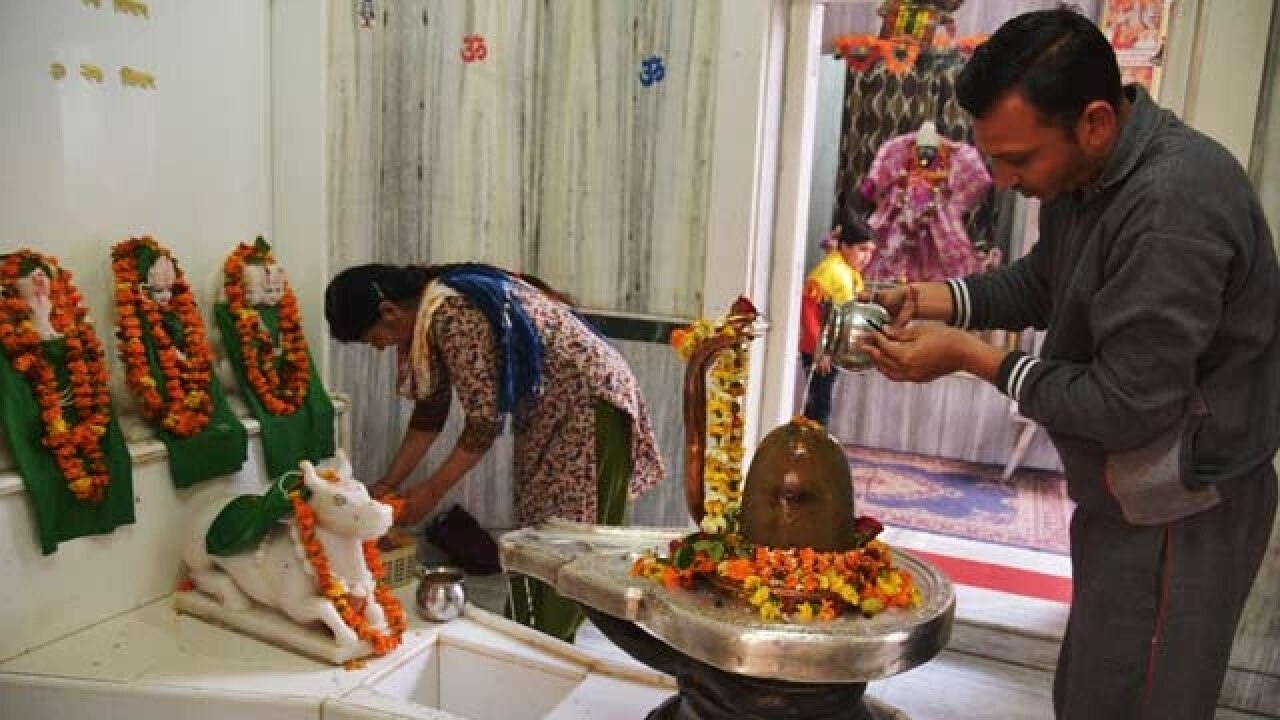
Maha Shivratri celebrations afp Maha Shivratri celebrations , AFP
The Hindu community in Pakistan's Mansehra district cut short its annual three-day Maha Shivaratri festival by a day mainly due to the prevailing security situation in the restive Khyber-Pakhtunkhwa province.
"We normally celebrate this festival for three days every year, but our elders decided to cut it short," Darshan Lal, a Hindu caretaker of the nearly 1,500 years old Shiv Temple in Mansehra, was quoted as saying by The Express Tribune.
Members of the Hindu community from across Pakistan gather at the Shiv Temple in Chiti Gati Gandiyan of Mansehra district to celebrate Shivaratri - believed to be the day when Lord Shiva and Parvati got married. The festival began on Friday amid tight security. Over 700 fasting devotees from as far as Abbottabad, Kohat, Banu, Mardan, Peshawar and Rawalpindi performed puja and traditional rituals such as Ashnan (bathing) of Shiv with milk and honey.
The devotees on Saturday performed the rites of mehendi and Sehra bandi of Shiva. Amid reverberating sounds of bells and chants of religious slogans, devotees circled around the linga, offering their prayers, the paper said. However, the festivities were cut short a day ahead of schedule as the pundits including Sham Lal, Chaman Lal and Ratan conducted a special puja, it said.
Explaining reasons behind cutting the festival short, Darshan Lal said there's not sufficient space to accommodate all the devotees in the temple and its surrounding village. Secondly, owing to the security situation, the elders had decided to end their celebrations on Saturday afternoon instead of Sunday evening, he added.

PESHAWAR: As the sun grows on the soft autumn sky, Zahid Kumar and his two sons take to the historic Goro Goraknath temple in the middle of Peshawar, to spend their day in service. “It’s not our job to clean the temple, but doing so brings my family a sense of religious fulfilment,” says the bronze-skinned gent.
Pre-independence, the province of Khyber-Pakhtunkhwa was home to approximately 50,000 Hindu families. But in the years after partition, the number dropped to only 1,200 in Peshawar as people migrated en masse to the other side of the border.
However, for all those who stayed back like Kumar, a sturdy man of 35, the city of Peshawar became a haven where they could continue to enjoy religious freedom and live peacefully alongside the Muslims.
“We’ve always lived in peace with our Muslim neighbours; we participate in their religious festivals and mourn with them in their days of sorrow like they do in our,” shares Kumar, who’s also the former president of Sankar Civil Society and a member of the National Peace Force Committee for Interfaith Harmony (NPFCIH). “Recently, the local Hindu community has also started setting up Sabils in the month of Muharram to honour the sacrifices of Hussain (RA),” he added.
The city of Peshawar today is home to four Hindu tribes – the Balmiks, the Rajputs, the Heer Ratan Raths and the Bhai Joga Singh Gurdwara community. Since partition, the four tribes have lived in harmony with all religious communities, sharing a special rapport with those of the Muslim faith. “There’s a mosque right in front of our temple, so there’s a lot of intermingling of the two faiths and we greet each other regularly,” said Kumar, as his sons frolicked barefoot on the courtyard’s sun-baked concrete floor.
Northern Pakistan

Hindu community in Khyber-Pakhtunkhwa cut short Maha Shivratri celebrations
In Mansehra district, the Hindu community have their annual Maha Shivratri celebrations for three days.

Maha Shivratri celebrations afp Maha Shivratri celebrations , AFP
The Hindu community in Pakistan's Mansehra district cut short its annual three-day Maha Shivaratri festival by a day mainly due to the prevailing security situation in the restive Khyber-Pakhtunkhwa province.
"We normally celebrate this festival for three days every year, but our elders decided to cut it short," Darshan Lal, a Hindu caretaker of the nearly 1,500 years old Shiv Temple in Mansehra, was quoted as saying by The Express Tribune.
Members of the Hindu community from across Pakistan gather at the Shiv Temple in Chiti Gati Gandiyan of Mansehra district to celebrate Shivaratri - believed to be the day when Lord Shiva and Parvati got married. The festival began on Friday amid tight security. Over 700 fasting devotees from as far as Abbottabad, Kohat, Banu, Mardan, Peshawar and Rawalpindi performed puja and traditional rituals such as Ashnan (bathing) of Shiv with milk and honey.
The devotees on Saturday performed the rites of mehendi and Sehra bandi of Shiva. Amid reverberating sounds of bells and chants of religious slogans, devotees circled around the linga, offering their prayers, the paper said. However, the festivities were cut short a day ahead of schedule as the pundits including Sham Lal, Chaman Lal and Ratan conducted a special puja, it said.
Explaining reasons behind cutting the festival short, Darshan Lal said there's not sufficient space to accommodate all the devotees in the temple and its surrounding village. Secondly, owing to the security situation, the elders had decided to end their celebrations on Saturday afternoon instead of Sunday evening, he added.
ghazi52
PDF THINK TANK: ANALYST

- Joined
- Mar 21, 2007
- Messages
- 101,794
- Reaction score
- 106
- Country
- Location
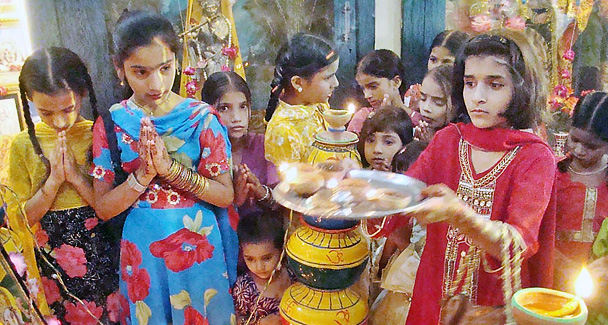






Tharis
Thar, a south-eastern district of Sindh province, houses more than 2.3 million Hindus, the largest Hindu population in a single district outside India. There are some traders and government employees among them, but a huge majority are farm workers and bonded labourers.
With their heavily embroidered clothes and wrists packed with bangles, Thari Hindus clearly dominate the Hinglaj pilgrimage in terms of numbers.
ghazi52
PDF THINK TANK: ANALYST

- Joined
- Mar 21, 2007
- Messages
- 101,794
- Reaction score
- 106
- Country
- Location
Pakistan capital to get Hindu temple, crematorium
The Hindu community living in the Pakistan capital will finally be getting a proper temple, allowing them to offer their religious rituals without having to travel out of this city anymore, besides a crematorium - the first in the city.
A simple ground breaking ceremony was held in Islamabad's H-9 sector area, allocating at least 4 kanal land for the construction of the first proper Hindu temple of the capital.
Parliamentary Secretary on Human Rights Lal Chand Malhi, performed the ceremony. He said the Hindu population in the capital has been increasing considerably in the past two decades, making it important to make a temple for them to worship in.

The Hindu community living in the Pakistan capital will finally be getting a proper temple, allowing them to offer their religious rituals without having to travel out of this city anymore, besides a crematorium - the first in the city.
A simple ground breaking ceremony was held in Islamabad's H-9 sector area, allocating at least 4 kanal land for the construction of the first proper Hindu temple of the capital.
Parliamentary Secretary on Human Rights Lal Chand Malhi, performed the ceremony. He said the Hindu population in the capital has been increasing considerably in the past two decades, making it important to make a temple for them to worship in.

ghazi52
PDF THINK TANK: ANALYST

- Joined
- Mar 21, 2007
- Messages
- 101,794
- Reaction score
- 106
- Country
- Location
Pakistan to reopen Kartarpur Corridor for Sikh pilgrims
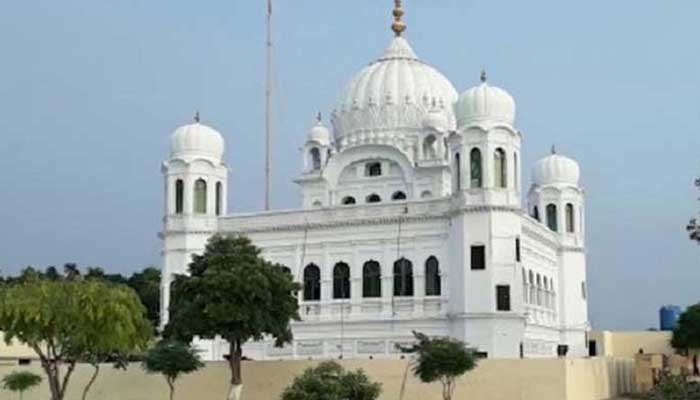
Foreign Minister Shah Mahmood Qureshi on Saturday said Pakistan will reopen the Kartarpur Corridor for all Sikh pilgrims on June 29.
“As places of worship open up across the world, Pakistan prepares to reopen the Kartarpur Sahib Corridor for all Sikh pilgrims, conveying to the Indian side our readiness to reopen the corridor on 29 June 2020, the occasion of the death anniversary of Maharaja Ranjeet Singh,” Qureshi tweeted.
The Foreign Office in a statement said the Kartarpur Corridor was a true symbol of peace and religious harmony.
“This landmark initiative by the government of Pakistan has been immensely appreciated by the Sikh community all over the world including India. The first Guru of Sikhism, Baba Guru Nanak Saheb, had spent the last 18 years of his life in Kartarpur,” the Foreign Office added.
The Corridor was temporarily closed on March 16, 2020, due to the COVID-19 pandemic.
“As the religious places are gradually opening up around the world, Pakistan has also made necessary arrangements to reopen Kartarpur Sahib Corridor for Sikh pilgrims,” it added.
Pakistan has invited India to work out necessary SOPs for reopening of the Corridor to ensure adherence to the health guidelines, the Foreign Office added.
Visit to Gurdwara Darbar Sahib in Kartarpur had been suspended for Sikh pilgrims in April by Pakistan as the country battled the coronavirus pandemic.
Earlier this week, the country reopened the Wagah border between the two countries for three days to repatriate stranded Indians in Pakistan.
According to the interior ministry 748 Indians stranded in Pakistan due to the coronavirus lockdown were to return to their country in three phases.
In the first and second batches, 250 Indian nationals each were repatriated while the third batch was made up of the remaining 248 Indian nationals, the interior ministry said, adding the Indian nationals were in different cities of Pakistan.
Pakistan on March 19 had closed the Wagah Border in its bid to prevent the spread of the virus in the country.
Work begins on first Hindu temple in Islamabad
On Friday Prime Minister Imran Khan approved the release of funds for the construction of the first Hindu temple in Islamabad.
In a meeting with Pakistan Tehreek-e-Insaf (PTI) MNAs Jay Parkash, Shanila Ruth, Laal Chand, Ramesh Kumar and Jamshed Thomas, the prime minister issued directives for accelerating the legislation process to protect minorities’ rights.
The temple is being constructed in the federal capital’s H-9/2 sector on a four-kanal plot of land allocated especially by the government.
The prime minister lauded the contribution of the minority community in the progress and prosperity of Pakistan and said it was the government’s priority to ensure the provision of equal opportunities for minorities and to protect their rights.

Foreign Minister Shah Mahmood Qureshi on Saturday said Pakistan will reopen the Kartarpur Corridor for all Sikh pilgrims on June 29.
“As places of worship open up across the world, Pakistan prepares to reopen the Kartarpur Sahib Corridor for all Sikh pilgrims, conveying to the Indian side our readiness to reopen the corridor on 29 June 2020, the occasion of the death anniversary of Maharaja Ranjeet Singh,” Qureshi tweeted.
The Foreign Office in a statement said the Kartarpur Corridor was a true symbol of peace and religious harmony.
“This landmark initiative by the government of Pakistan has been immensely appreciated by the Sikh community all over the world including India. The first Guru of Sikhism, Baba Guru Nanak Saheb, had spent the last 18 years of his life in Kartarpur,” the Foreign Office added.
The Corridor was temporarily closed on March 16, 2020, due to the COVID-19 pandemic.
“As the religious places are gradually opening up around the world, Pakistan has also made necessary arrangements to reopen Kartarpur Sahib Corridor for Sikh pilgrims,” it added.
Pakistan has invited India to work out necessary SOPs for reopening of the Corridor to ensure adherence to the health guidelines, the Foreign Office added.
Visit to Gurdwara Darbar Sahib in Kartarpur had been suspended for Sikh pilgrims in April by Pakistan as the country battled the coronavirus pandemic.
Earlier this week, the country reopened the Wagah border between the two countries for three days to repatriate stranded Indians in Pakistan.
According to the interior ministry 748 Indians stranded in Pakistan due to the coronavirus lockdown were to return to their country in three phases.
In the first and second batches, 250 Indian nationals each were repatriated while the third batch was made up of the remaining 248 Indian nationals, the interior ministry said, adding the Indian nationals were in different cities of Pakistan.
Pakistan on March 19 had closed the Wagah Border in its bid to prevent the spread of the virus in the country.
Work begins on first Hindu temple in Islamabad
On Friday Prime Minister Imran Khan approved the release of funds for the construction of the first Hindu temple in Islamabad.
In a meeting with Pakistan Tehreek-e-Insaf (PTI) MNAs Jay Parkash, Shanila Ruth, Laal Chand, Ramesh Kumar and Jamshed Thomas, the prime minister issued directives for accelerating the legislation process to protect minorities’ rights.
The temple is being constructed in the federal capital’s H-9/2 sector on a four-kanal plot of land allocated especially by the government.
The prime minister lauded the contribution of the minority community in the progress and prosperity of Pakistan and said it was the government’s priority to ensure the provision of equal opportunities for minorities and to protect their rights.
Pakistani Fighter
ELITE MEMBER

- Joined
- Jul 4, 2011
- Messages
- 9,124
- Reaction score
- -5
Wow Sikhs are in Karachi too
Gurdwara Arambagh, Karachi
Stifled amid two large buildings stands a symbol of the inter-communal harmony that has been the cultural hallmark of the Sindhi Nation since many a millenia . This white, two-storey building is the Gurdwara Arambagh in Karachi, the provincial capital of Sindh province. A 'No Parking' sign has been crudely painted onto the building. A signboard on the door of the Gurdwara Arambagh reads, "Recognise the human race one. Gurdwara Sahab Arambagh, Karachi (Sindh)." A bit of trivia: the historical pre-Independence name of this area was Rambagh (Garden of Ram) which was renamed Arambagh (Garden of Rest) after 1947.
ghazi52
PDF THINK TANK: ANALYST

- Joined
- Mar 21, 2007
- Messages
- 101,794
- Reaction score
- 106
- Country
- Location
PM approves grant for construction of Hindu temple in Islamabad
June 27, 2020

Prime Minister Imran Khan has given a verbal approval.
ISLAMABAD: Prime Minister Imran Khan has approved a grant of Rs100 million for the construction of the first Hindu temple in the capital.
The request for the grant of the amount was made to the prime minister by Minister for Religious Affairs Pir Noorul Haq Qadri during a meeting with the prime minister.
The meeting was also attended by a delegation of MNAs belonging to religious minorities including Lal Chand Malhi, Dr Ramesh Vankwani, Jai Prakash Ukrani, Shunila Ruth and James Thomas.
The delegation discussed the issues faced by religious minorities and lauded the efforts of civil and armed forces in crushing the terrorist networks across the country who had been targeting people of other faiths as part of their extremist agenda.
The delegation sought the support of the government for the construction of first temple in the capital. The prime minister gave verbal approval.
The minister for religious affairs told Dawn that the summary in this regard had already been sent to the PM Secretariat.
“We will pursue the matter with the PM Secretariat and it is expected that it will be signed next week,” the minister said.
As per the official procedure, the copy of approval will be sent to the finance ministry for allocation of grant while construction work will be executed by Pak-PWD.
Meanwhile, Lal Chand Malhi said the Hindu population in Islamabad had reached to around 3,000, which included government employees, private sector employees, members of the business community and a large number of doctors.
“While the official formalities are underway, we have decided to continue the initial ground works including the levelling of the land and erecting the boundary wall,” Mr Malhi added.
Hindu Panchayat Islamabad will manage the Shri Krishna Mandir. The Panchayat’s president, Mahesh Chaudhry, said a large number of people from various parts of the country, including Balochistan and Sindh, had shifted to Islamabad, mainly due to insecurity in those areas.
“Now when we have families here, there is a need for a crematorium, a place for collective prayers and marriage ceremonies,” Mr Chaudhry said, adding that “currently, we hold Holi and Diwali functions in government’s community halls or marquee.”
Though there will be a place for Hindus to exercise their rituals in the near future, to solemnise marriage is legally not possible in Islamabad as there are no officially notified rules and regulations regarding Hindu Marriage Law 2017, even three years after the law was enacted.
Published in Dawn, June 27th, 2020
June 27, 2020

Prime Minister Imran Khan has given a verbal approval.
ISLAMABAD: Prime Minister Imran Khan has approved a grant of Rs100 million for the construction of the first Hindu temple in the capital.
The request for the grant of the amount was made to the prime minister by Minister for Religious Affairs Pir Noorul Haq Qadri during a meeting with the prime minister.
The meeting was also attended by a delegation of MNAs belonging to religious minorities including Lal Chand Malhi, Dr Ramesh Vankwani, Jai Prakash Ukrani, Shunila Ruth and James Thomas.
The delegation discussed the issues faced by religious minorities and lauded the efforts of civil and armed forces in crushing the terrorist networks across the country who had been targeting people of other faiths as part of their extremist agenda.
The delegation sought the support of the government for the construction of first temple in the capital. The prime minister gave verbal approval.
The minister for religious affairs told Dawn that the summary in this regard had already been sent to the PM Secretariat.
“We will pursue the matter with the PM Secretariat and it is expected that it will be signed next week,” the minister said.
As per the official procedure, the copy of approval will be sent to the finance ministry for allocation of grant while construction work will be executed by Pak-PWD.
Meanwhile, Lal Chand Malhi said the Hindu population in Islamabad had reached to around 3,000, which included government employees, private sector employees, members of the business community and a large number of doctors.
“While the official formalities are underway, we have decided to continue the initial ground works including the levelling of the land and erecting the boundary wall,” Mr Malhi added.
Hindu Panchayat Islamabad will manage the Shri Krishna Mandir. The Panchayat’s president, Mahesh Chaudhry, said a large number of people from various parts of the country, including Balochistan and Sindh, had shifted to Islamabad, mainly due to insecurity in those areas.
“Now when we have families here, there is a need for a crematorium, a place for collective prayers and marriage ceremonies,” Mr Chaudhry said, adding that “currently, we hold Holi and Diwali functions in government’s community halls or marquee.”
Though there will be a place for Hindus to exercise their rituals in the near future, to solemnise marriage is legally not possible in Islamabad as there are no officially notified rules and regulations regarding Hindu Marriage Law 2017, even three years after the law was enacted.
Published in Dawn, June 27th, 2020
ghazi52
PDF THINK TANK: ANALYST

- Joined
- Mar 21, 2007
- Messages
- 101,794
- Reaction score
- 106
- Country
- Location
June 29, 2020
Pakistan opens Kartarpur Corridor after three-and-a-half month closure
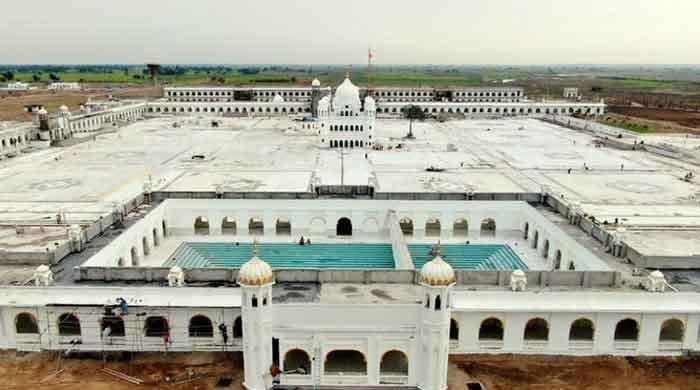
LAHORE: The Kartarpur Corridor was reopened today [Monday] after three-and-a-half months to commemorate the death anniversary of Sikh Maharaja Ranjit Singh, said Punjab’s Evacuee Trust Property Board.
According to the board, the corridor was closed in March and the board said that it has been reopened on the request of the Sikh community.
According to Sardar Gobind Singh, Head Granthi Darbar, Kartarpur, the death anniversary rituals of Sikh Maharaja Ranjit Singh at Darbar Baba Guru Nanak Kartarpur were held today.
However, due to the lockdown, the entry to Kartarpur Gurdwara has been closed.
Sardar Gobind Singh further said that the entire Sikh nation is immensely happy with the reopening of the corridor after nearly four months.
He said that Sikh pilgrims from all over the world, including Pakistan, would participate in a prayer ceremony on the occasion while the Indian government should also allow Sikh pilgrims to visit Kartarpur corridor.
Prime Minister Imran Khan had inaugurated the Kartarpur Corridor on November 9 last year but the corridor was closed after the outbreak of the COVID-19.
On the other hand, Pakistan had announced to open Kartarpur corridor on June 29 and India was also informed about the development but New Delhi had refused to open the corridor for its pilgrims.
Pakistan opens Kartarpur Corridor after three-and-a-half month closure

LAHORE: The Kartarpur Corridor was reopened today [Monday] after three-and-a-half months to commemorate the death anniversary of Sikh Maharaja Ranjit Singh, said Punjab’s Evacuee Trust Property Board.
According to the board, the corridor was closed in March and the board said that it has been reopened on the request of the Sikh community.
According to Sardar Gobind Singh, Head Granthi Darbar, Kartarpur, the death anniversary rituals of Sikh Maharaja Ranjit Singh at Darbar Baba Guru Nanak Kartarpur were held today.
However, due to the lockdown, the entry to Kartarpur Gurdwara has been closed.
Sardar Gobind Singh further said that the entire Sikh nation is immensely happy with the reopening of the corridor after nearly four months.
He said that Sikh pilgrims from all over the world, including Pakistan, would participate in a prayer ceremony on the occasion while the Indian government should also allow Sikh pilgrims to visit Kartarpur corridor.
Prime Minister Imran Khan had inaugurated the Kartarpur Corridor on November 9 last year but the corridor was closed after the outbreak of the COVID-19.
On the other hand, Pakistan had announced to open Kartarpur corridor on June 29 and India was also informed about the development but New Delhi had refused to open the corridor for its pilgrims.
Similar threads
- Replies
- 7
- Views
- 356
- Replies
- 1
- Views
- 225
- Replies
- 28
- Views
- 1K
- Replies
- 1
- Views
- 419
Latest posts
-
-
-
Argentina Considering To Purchase 12 JF17C Worth 664Million Dollars
- Latest: FourMikeEcho
-
Pakistan Affairs Latest Posts
-
Pakistan military officer sues Adil Raja for defamation in unprecedented UK action
- Latest: muhammadhafeezmalik
-














